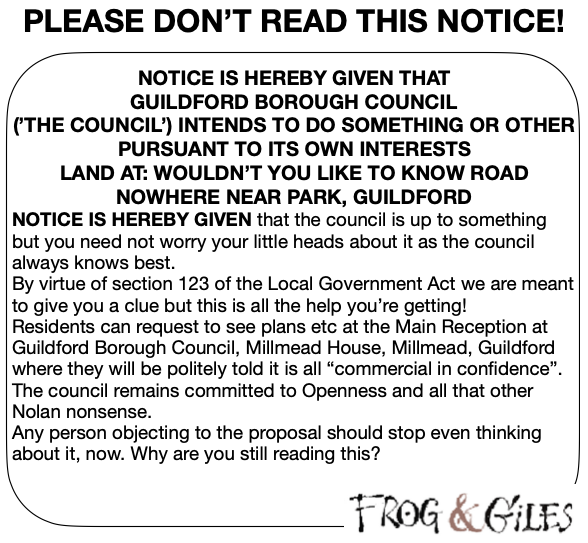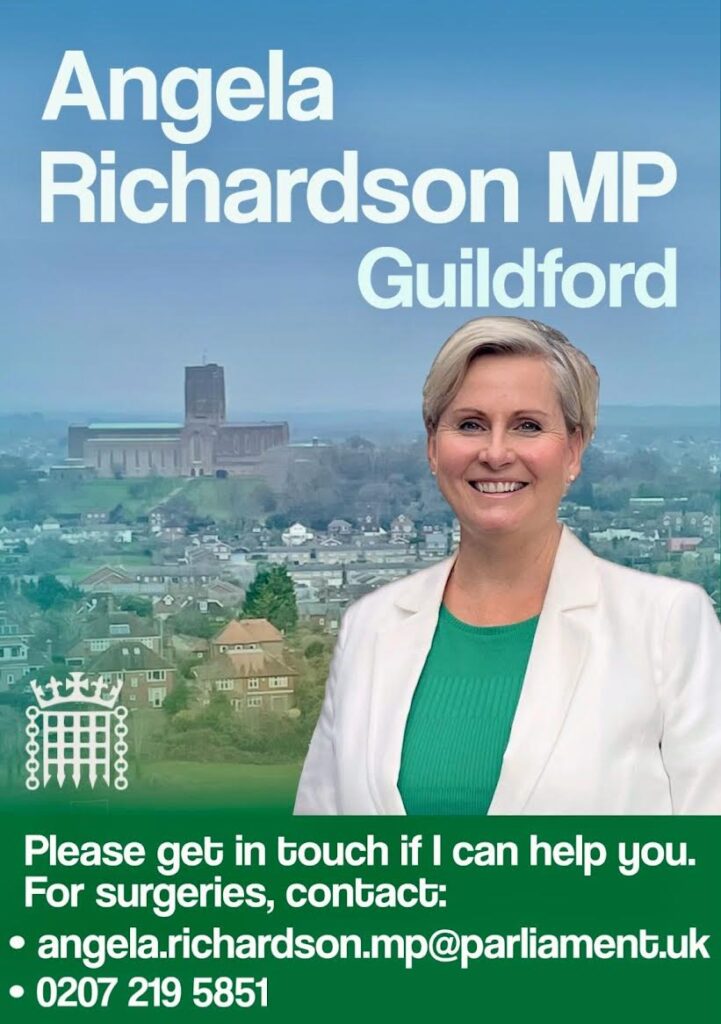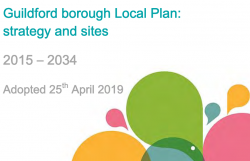 Abraham Lincoln
If given the truth, the people can be depended upon to meet any national crisis...
Abraham Lincoln
If given the truth, the people can be depended upon to meet any national crisis...
 Guildford news...
for Guildford people, brought to you by Guildford reporters - Guildford's own news service
Guildford news...
for Guildford people, brought to you by Guildford reporters - Guildford's own news service
Letter: If Cllr Spooner Dislikes Local Plan Results, He Should Consider His Own Failings
Published on: 28 Oct, 2020
Updated on: 28 Oct, 2020
In response to: Time to Move On to Managing Delivery of the Local Plan Strategic Sites
As Cllr Paul Spooner is well aware, the Savills team I lead is responsible for managing corporate property globally for substantial companies.
I joined Savills long after I was arguing for better planning in Guildford, in fact, while I was managing 160 million sq ft of property for General Motors across Europe.
I have no planning brief within Guildford and my engagement in Guildford borough, including my comments on the Local Plan, have been in my capacity as a member of Guildford Vision Group and as past chair of the Guildford Society.
My planning credentials come from dealing with planning authorities (not Guildford) over almost 40 years and my roles as former chair of the CBI Property Group, member of the commercial board of RICS and having served on the sounding board for the Killian Pretty review of planning under the Blair government. So you might well ask: “What do I know?”
I assume Cllr Spooner is renewing his attempts to pit me against my employers because he is terrified I might stand in the county council elections. There is clearly no merit otherwise in trying to connect me with developers (clients of Savills or not) and developments in Guildford borough.
Turning to Cllr Spooner’s individual points (and using his numbering):
1) The council’s approach was demonstrably NOT brownfield first. Look at the facts. Cllr Spooner saw regeneration and redevelopment of urban sites as too difficult, not deliverable, and therefore not worth bothering with (in the context of the Local Plan).
I pointed out there should have been some sensitivity to the modelling of the Sustainability Appraisal (SA) that illustrated how intensifying urban development might have fared when compared with incursions into the green belt.
I have also said (not that it was popular across the borough) if incursions into the green belt in this Plan period delivered the result that urban areas could be brought forward to prevent future incursions, this might be a price worth paying.
If Cllr Spooner’s discredited leadership were looking at brownfield first, the regeneration processes would not only now be beginning in earnest (under R4GV leadership).
2) The Inspector’s conclusions were, in my view, somewhat railroaded because the Sustainability Appraisal only modelled (as I said, and as Mr Ben Paton demonstrated) different developments in the green belt and not any options in urban areas.
Note that the local authority has to decide which options to model in a Sustainability Appraisal.
With the council’s QC breathing down the inspector’s neck (and he was charged with the obligation “unless the Plan was legally unsound” to direct the council to adopt the Plan), it is perhaps unsurprising he found sound the 50% surplus of housing provision above agreed need.
Strictly toeing the legal line does not, of itself, amount to good management or good planning, and that deprives Cllr Spooner of absolutely any right to occupy the moral high ground he seems to believe is his.
3) The council routinely disregarded comments about the Sustainability Appraisal at every consultation, then ignored most representations at each successive iteration.
The error-strewn evidence base is a testament to this ostrich-headed approach by the unlamented ex-leader and most of his ex-colleagues.
At every consultation, I pointed out that the Settlement Profiles Report still said the nearest convenience shopping to Peasmarsh was in East Horsley (among other shortcomings).
Cllr Spooner’s note does give away quite a substantial concession. He links the SA with the need for the Plan process to exclude sites unlikely to be delivered during the lifetime of the Plan.
My SA point was that there should have been some scenarios modelled in the SA where they intensified the development of deliverable sites in the urban areas to TEST whether the higher/denser development of such sites would cause greater harm than applying the equivalent number of units in the countryside.
Look at Solum to see the harm; not modelled in the SA but clearly capable of being brought forward during the Plan period at a higher housing provision than was modelled in the SA. QED
4) This Spooner point is also patently false. North Street was retained as a retail site when we all knew it would not be delivered as such. There are other such sites.
I have never sought to make the argument that all of the solutions lie in the town centre but Cllr Spooner needs to think about the fifth purpose of the green belt in the NPPF (2012 and 2018), namely, to bring about the regeneration of brownfield sites. If it is too easy to develop greenfield sites, the brownfield sites never get a look-in.
5) Under Cllr Spooner, the council did not bring forward the development management part of the Local Plan, and now Cllr Spooner lectures me and your readers on shaping the best development across the borough.
6) We have rehearsed the arguments for and against the respective sites in various forms and there is no merit in looking at these here, except to say it is difficult to see how these sites will connect to the communities they neighbour, nor how these developments will help solve any of those suffering from relative deprivation (of various kinds).
See the Guildford Society’s consultation responses for a full report on these nationally-available indicators of local issues that should have been resolved through the Local Plan process.
For the unnumbered points in Cllr Spooner’s letter, I will deal in the round with those that merit a response.
Ash & Tongham have been comprehensively damaged by successive councils, and Cllr Spooner’s wafer-thin majority in the last local election speaks volumes about his inability to convince his constituents he had their best interests at heart.
The ward really needs master planning so it can emerge as a more coherent (and protected) urban area, and to remedy, at last, the issues created by decades of poor plan-making in the area.
Cllr Spooner talks of infrastructure being provided in the Local Plan and yet the most crucial infrastructure identified in the public inquiry, namely the A3 improvements, were not “nailed down”, or to quote Cllr Spooner in his point (3), were simply not deliverable.
Clearly, Cllr Spooner can overlook deliverability when it suits him and lecture us on it when he chooses.
The arguments have been made often and vociferously by many in respect of Cllr Spooner’s choice of target housing number. I don’t intend to revisit these. My arguments have been much more about the political decisions taken by Cllr Spooner and his (mostly former) councillor colleagues.
Let me reiterate, this has nothing whatsoever to do with my position and role at Savills. I am comfortable my Savills Guildford colleagues are high-quality professionals and they will work with the Local Plan and other instruments Cllr Spooner put in place.
So, if Cllr Spooner does not like the outcomes, he should place the blame on his own failings rather than look to me for an excuse.
I hope those who voted for Cllr Spooner and his colleagues in the borough elections will think very hard in the county elections before even considering putting a cross in the Conservative (or even “independent” Conservative) box, given Cllr Spooner’s selective memory, and his propensity to try to bully me publicly for my day job.
Responses to Letter: If Cllr Spooner Dislikes Local Plan Results, He Should Consider His Own Failings
Leave a Comment Cancel replyPlease see our comments policy. All comments are moderated and may take time to appear.

See Dragon story: GBC’s Explanation of Major Land Sale Notice Error ‘Borders on Arrogant’ Says Councillor






Recent Articles
- New Approach to Mental Health Concerns Reported to the Police
- Letter: Bernard Quoroll ‘s Insight Should Be Heard
- Police and Crime Commissioner Candidate Interview – Paul Kennedy
- Staff Union Warns Surrey University of No Confidence Votes
- Invitation to Join Mass Bike Ride on Saturday, April 27
- Thames Water Clarify Compensation Payments
- Surrey Fire and Rescue Service Urges Us All To Be ‘Wildfire Aware’
- Police and Crime Commissioner Candidate Interview – Lisa Townsend
- Insights Part 3: The Council Should Not Be Marking Its Own Homework
- Notice: In Our Own Words


Recent Comments
- Bibhas Neogi on M25 Junction 10 Project Required Major Engineering to Overcome Pipeline Snag
- Roland Dunster on Birdwatcher’s Diary No.302
- J Davies on Insights Part 3: The Council Should Not Be Marking Its Own Homework
- Angela Richardson on Insights Part 3: The Council Should Not Be Marking Its Own Homework
- Peter Wilkinson on Anger Over Traffic Impact of Golf Club Scheme
- Nicola King on Anger Over Traffic Impact of Golf Club Scheme
Search in Site
Media Gallery
Dragon Interview: Local Artist Leaves Her Mark At One of England’s Most Historic Buildings
January 21, 2023 / No Comment / Read MoreDragon Interview: Lib Dem Planning Chair: ‘Current Policy Doesn’t Work for Local People’
January 19, 2023 / No Comment / Read MoreA3 Tunnel in Guildford ‘Necessary’ for New Homes, Says Guildford’s MP
January 10, 2023 / No Comment / Read More‘Madness’ for London Road Scheme to Go Ahead Against ‘Huge Opposition’, Says SCC Leader
January 6, 2023 / No Comment / Read MoreCouncillor’s Son Starts Campaign for More Consultation on North Street Plan
December 30, 2022 / No Comment / Read MoreCounty Council Climbs Down Over London Road Works – Further ‘Engagement’ Period Announced
December 14, 2022 / No Comment / Read MoreDragon Interview: GBC Reaction to the Government’s Expected Decision to Relax Housing Targets
December 7, 2022 / No Comment / Read MoreHow Can Our Town Centre Businesses Recover? Watch the Shop Front Debate
May 18, 2020 / No Comment / Read More







Jan Messinger
October 28, 2020 at 12:06 pm
Well said Mr Lyon.